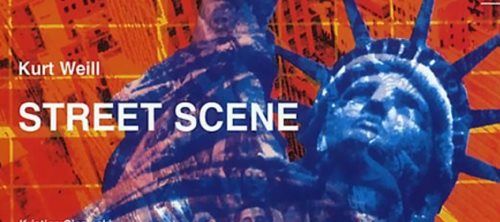
Street Scene is a story of love, passion, greed and death on a New York City street. The show concerns life in a tenement house between one evening and the next afternoon. The show focuses primarily on the Maurrant family. Frank Maurrant, a Broadway stagehand, is an abusive drunk. His wife, Anna, is having an affair with Mr. Sankey. Their daughter, Rose, is caught in the middle of her feuding parents and struggles with her own problems. When Frank catches Anna having an affair, he shoots her dead. Nevertheless, after the carnage is cleared up, life goes on as normal on the New York street.
The play takes place on the doorstep of a tenement on the East Side of Manhattan on two brutally hot days in 1946. The story focuses on two plotlines: the romance between Rose Maurrant and her neighbor Sam Kaplan; and on the extramarital affair of Rose's mother, Anna, which is eventually discovered by Rose's irritable father, Frank. The show portrays the ordinary romances, squabbles and gossips of the neighbors, as the mounting tensions involving the Maurrant family eventually build into a tragedy of epic proportions.
[edit] Act 1As the curtain rises, we are introduced to some of the residents of the apartment block where the action takes place. Emma Jones and Greta Fiorentino lament the incredible heatwave that is gripping New York (Ain't It Awful, The Heat?). They are joined by another neighbor Olga Olsen, who tells of the stress of dealing with her newborn baby and her husband Carl, and an old man, Abraham Kaplan, who sings of the murders and scandals in the press, whilst joining in with the opening number. Henry Davis, the janitor, enters from the basement and sings of his ambitions to greater things (I Got A Marble And A Star). Young Willie Maurrant enters and calls for his mother, who enters at the window and throws him a dime to buy a soda. The three women (Mrs. Jones, Mrs. Fiorentino and Mrs. Olsen) persuade Mrs. Maurrant to come downstairs and be sociable, and as she descends, they gossip about the rumour that Mrs. Maurrant and Steve Sankey, the milkman, have been having an affair (Get A Load Of That). Mrs. Maurrant comes down to chat and Mrs. Olsen goes back down to her cellar apartment to tend to her baby. Sam Kaplan comes out of the house and asks after Mrs. Maurrant's daughter, Rose, but she hasn't got back from work yet. He leaves to go to the library.
Daniel Buchanan enters, jittery; he's nervous because his wife is upstairs about to have a baby. He and the women sing of the perils of childbirth in a short Arietta, When A Woman Has A Baby. Just as he runs upstairs to tend to his wife, Mrs. Maurrant's husband Frank comes home. He mentions that he is going on a business trip to New Haven tomorrow, and argues with his wife about Rose not being home yet (She Shouldn't Be Staying Out Nights). Fuming, he storms into the house, just as George Jones returns home from work and chats with the ladies for a while. Anna Maurrant sings an aria about the importance of putting your faith in a brighter tomorrow (Somehow I Never Could Believe). Steve Sankey enters and a tense scene ensues between him and the suspecting women. Almost immediately after he departs, Mrs. Maurrant heads off in the same direction, under the guise of going to look for her son. Mr. Jones, Mr. Olsen, Mrs. Jones and Mrs. Fiorentino sing more about the scandal (Whatcha Think Of That). Mrs. Olsen runs in excited and says that she has just seen Sankey and Mrs. Maurrant standing close together around the back of a local warehouse.
Lippo Fiorentino returns home from work with an armful of ice cream cones for everybody. The two Fiorentino's, the two Olsen's, Mr. Jones and Henry Davis sing a jubilant sextet praising ice cream (Ice Cream Sextet). Maurrant has been watching, and when his wife comes back he questions her about where she's been. She tells him she's been looking for Willie, and Maurrant and Abraham Kaplan argue about parenting, and later economics. Kaplan uses the example of the Hildebrand family who live upstairs, who are run by a struggling single mother who is unable to pay the rent, to illustrate his point. Maurrant and Kaplan's argument almost becomes physical, but the neighbors and Kaplan's granddaughter Shirley hold the two men back. Maurrant sings about how he longs for a return to traditional moral values in Let Things Be Like They Always Was. Immediately after, Jennie Hildebrand and other high-school girls enter the street coming home from their graduation ceremony. The ensemble sings a jubilant celebration number, Wrapped In A Ribbon And Tied In A Bow. Steve Sankey's entrance causes an abrupt end to the celebrations. After the awkward silence of the neighbors forces him to leave, Sam brings Willie Maurrant on in tears. Willie has been fighting with a local kid and Sam stepped in to break it up. Mr. Maurrant leaves to go to the local bar to have a drink, warning that there'll be trouble if Rose isn't home by the time he gets back, whilst Mrs. Maurrant takes Willie upstairs. As soon as they leave, the neighbors all begin gossiping about the Maurrant family. Sam gets passionately upset, chiding the neighbors for gossiping so much behind their backs, and then storms off.
All the neighbors say goodnight and go to bed, except Mr. Jones, who goes to the bar to shoot some pool. Sam returns onstage and sings of his crippling loneliness (Lonely House). Sam goes into the house, then Rose enters with her boss, Harry Easter, who has walked her home. Easter attempts to charm Rose, taking her in his arms and kissing her. He then tries to win her over with a tempting song, promising her that if she were to run away with him he could get her a gig on Broadway (Wouldn't You Like To Be On Broadway?). Rose, however, sticks to her convictions, and sings a Cavatina about how she will always choose true love over showy promises (What Good Would The Moon Be?). Rose sees her father returning home and tells Easter to leave. Maurrant questions her about who she was talking to, and gets angry when she tells him that they had been out dancing. He goes upstairs to bed, furious. Buchanan rushes out of the house and asks Rose to go and phone the doctor, as his wife's baby is about to be born. He heads back upstairs, and as Rose is leaving, she passes young Mae Jones and her suitor, Dick McGann. The two have been out dancing and are flirting, and they sing a fast-paced jitterbug about their infatuation with one another (Moon-faced, Starry-eyed). After they dance on the sidewalk, they passionately run upstairs into the house, after saying a drunken good-night to Rose, who has returned from phoning the doctor.
Mae's brutish elder brother Vincent returns home, and begins harassing Rose. Sam sees him hassling her out of the window, and comes outside to confront him, however Vincent violently lays him out on the sidewalk. Vincent is about to continue his attack when his mother, Mrs. Jones, comes outside to see what the commotion is. He immediately seizes up and innocently goes upstairs at his mother's order. Sam and Rose are left alone, and Sam is embarrassed that he was humiliated by Vincent in front of Rose. Sam laments the terrible strife of living in the slums, but Rose calms him down by reminding him of a poem he once read her (Remember That I Care). Dr. Wilson arrives and goes upstairs to tend to Mrs. Buchanan, and Mr. Maurrant calls Rose and tells her to go to bed. Sam and Rose share a kiss on the sidewalk, and then Rose runs up to bed, just as Henry Davis comes upstairs and starts sweeping the stoop for the night (I Got A Marble And A Star (Reprise)). Rose calls goodnight to Sam from the window and Sam is left alone on the midnight street as the curtain slowly falls to end Act 1.
[edit] Act 2Scene 1: Daybreak, the next morning
Mr. Jones drunkenly returns home from the bar and reels into the house. Dr. Wilson leaves the house, telling Buchanan to let his wife get plenty of rest, and Dick McGann and Mae Jones share a much less passionate goodbye in the cold light of day than their energetic exchanges the night before. Willie Maurrant, Charlie and Mary Hildebrand, Henry's daughter Grace, and other local children play an energetic game (Catch Me If You Can), which ends in a large scuffle. Rose calls for them to stop it from the window, whilst Sam comes outside and physically breaks the fight up. The children all disperse. Sam and Rose have a brief conversation, as Rose tells him that she has to go to the funeral of the head of her real estate firm this morning. Shirley comes outside and tells Sam to come in for breakfast, as Rose goes back inside to do the dishes. Buchanan comes outside and tells the Fiorentino's that he has had a little baby girl in the night. Mrs. Jones and Mrs. Maurrant enter, and Mrs. Jones asks her about Mrs. Buchanan, who Mrs. Maurrant has been looking after all night. Mrs. Jones leaves to walk her dog, and Mrs. Maurrant leaves to go to the grocery store. Rose and Mr. Maurrant come out of the house and Rose tries to persuade him to be nicer to her mother. Mrs. Maurrant returns and the three have a family argument about Mr. Maurrant's behaviour. Mrs. Maurrant asks him nonchalantly how long he'll be gone on his business trip for, and Mr. Maurrant accuses her of having an affair, which she denies. He leaves in a rage, and Mrs. Maurrant and Rose lament his behaviour (There'll Be Trouble). Willie comes on and Rose chides him for looking scruffy. Willie and Rose have a verbal disagreement and Rose quickly storms into the house. Mrs. Maurrant tells him that that is no way to talk to his sister, and that she is relying on him to turn into a good man when he is older (A Boy Like You). Willie leaves for school and Mrs. Maurrant goes into the house, as Rose comes out. Shirley Kaplan comes out of the house and asks Rose why she spends so much time with Sam, when he should be concentrating on his work. Shirley leaves for work, and Vincent Jones comes out of the house and starts harassing Rose again, but promptly leaves as Sam comes out of the house. Rose mentions Easter's tempting offer of running away to Sam, and Sam gets upset, saying that she would be better off running away with him, and the two sing of their intention to run away together (We'll Go Away Together). Easter arrives to walk Rose to the funeral, and the two leave. Sam goes into the house, as Sankey appears. Mrs. Maurrant appears at her window and tells him to come upstairs, as Mr. Maurrant has gone on his business trip and Rose will be at the funeral all morning. As Sankey hurries upstairs he passes Sam coming out of the house, who looks up at the window and sees Mrs. Maurrant pulling the shades shut. Sam sits on the stoop and reads a book, as James Henry, a city-marshall, and Fred Cullen, his assistant, appear. They call Henry Davis up and tell him that they're here to dispossess the Hildebrand family, and that since she has made no arrangements to have the furniture taken away, they'll have to dump it on the sidewalk. Henry goes back into the cellar as the two men enter the house. Mr. Maurrant returns, having changed his mind about the business trip. He sees the shades pulled shut and becomes furious. Sam pleads with him not to enter the house but he pushes him aside and runs upstairs. Mrs. Maurrant is heard screaming, and then two gunshots. Sankey appears at the window in terror, he tries to escape but Maurrant pulls him back inside and shoots him. Panic ensues, as Maurrant exits the house, covered in blood, and points his revolver at the crowd of gatherers in order to make his escape. Policemen, paramedics, concerned neighbors flood the scene. Rose returns from the funeral and sees the concerned crowd. Sam tries to keep her back but she cannot be restrained. The ensemble sings a tragic chorus number about the killing, The Woman Who Lived Up There. Mrs. Maurrant's body is brought out of the house on a stretcher and taken to the hospital and the citizens rush after the ambulance, as Rose, quietly crying in Sam's arms, follows. The curtain slowly falls as the two city-marshalls continue bringing the Hildebrand furniture out onto the sidewalk.
Scene 2: Mid-afternoon, the same day
Two young nursemaids appear at the house and sing about the scandal of the murder that has already spread around the city, as they try to quiet the children they are looking after (Lullaby). As the nursemaids leave, Rose enters, dressed in black. She asks Officer Murphy, the policeman who is still in her apartment, if they have found her father yet, and he tells her that they haven't. Sam enters and tells Rose that he has taken Willie from school round to her aunt's house. Shirley enters and expresses her condolences to Rose, and the two of them go up to Rose's apartment together, as Rose is afraid to go up alone. Sam tells his grandfather that the police are going to make him testify against Maurrant, when two shots are heard in the distance. Buchanan and Olsen run on and tell Sam and Rose (who has run out of the house, alerted by the noise) that the police have found her father hiding in the basement of a house down the street. Two policemen bring on Maurrant, who is covered in blood and dirt. The officers are taking him away when he begs for one minute with his daughter, which they grant him. He and Rose talk about the murder, as the crowd looks on (He Loved Her Too). The officers take Maurrant off, and Rose and Sam are left alone onstage. Rose starts to enter the house when Sam asks what she's going to do. She tells him she'll go away, but when he says that he'll go with her like they discussed that morning, Rose says she has to go off alone. Sam finally confesses to Rose that he is in love with her, and that his life is nothing without her. Rose says that her parents have proved that two people do not belong to be together, and she says goodbye to Sam (Don't Forget The Lilac Bush). Shirley comes out of the house and hands Rose a suitcase full of her things. Rose starts walking off, then returns and swiftly kisses Sam, but he breaks away and goes abruptly into the house. Rose stands looking after him, then picks up her bag and walks off. Mrs. Fiorentino, Mrs. Olsen and Mrs. Jones appear and immediately begin gossiping about Rose and Easter hanging around on the street late last night (Ain't It Awful, The Heat? (Reprise)), as they once again lament the unbearable heat and the curtain slowly falls.
En 1947, Kurt Weill présente Street Scene, son ouvrage le plus lyrique, gratifié du premier Tony Award de l’histoire de Broadway. Dès la lecture de la pièce à succès d’Elmer Rice, prix Pulitzer 1929, il comprend qu’il tient « le sujet parfait pour un opéra américain, par son récit prenant et la richesse de ses protagonistes ». L’histoire de cette rue de New York lors d’une journée de canicule, avec ses personnages hauts en couleur, entre au répertoire du New York City Opera en 1959, neuf ans après la mort de Kurt Weill, réalisant ainsi le rêve du compositeur d’origine allemande : écrire un opéra américain.
Immigré aux États-Unis en 1935, Kurt Weill tentera de donner à Broadway un ton plus « opéra ». Entre 1936 et 1949 il compose huit partitions pour le fameux quartier des théâtres. Ainsi, avec ses comédies musicales sophistiquées, il est l’un des précurseurs du concept musical, cher à Stephen Sondheim, basé sur la psychologie des personnages.
In Germany, in the late 1920s and early 1930s, Weill had already begun to use American jazz and popular song elements in his operas. After fleeing from Germany in 1933, he worked in Paris, then England, and then, beginning in 1935, in New York. Weill made a study of American popular and stage music and worked to further adapt his music to new American styles in his writing for Broadway, film and radio. He strove to find a new way of creating an American opera that would be both commercially and artistically successful.[2] Weill wrote:
"It's my opinion that we can and will develop a musical-dramatic form in this country (America) but I don't think it will be called 'opera', or that it will grow out of the opera which has become a thing separate from the commercial theater, dependent upon other means than box-office appeal for its continuance. It will develop from and remain a part of the American theater – 'Broadway' theater, if you like. More than anything else, I want to be a part in that development."[3]
Weill sought to create musical theatre that would "integrate drama and music, spoken word, song, and movement."[4] He further wrote:
"This form of theater has its special attraction for the composer, because it allows him to use a great variety of musical idioms, to write music that is both serious and light, operatic and popular, emotional and sophisticated, orchestral and vocal. Each show of this type has to create its own style, its own texture, its own relationship between words and music, because music becomes a truly integral part of the play – it helps deepen the emotions and clarify the structure.[5]
Weill saw Rice's naturalistic play in 1930 and wanted to adapt it. As he wrote:
"It was a simple story of everyday life in a big city, a story of love and passion and greed and death. I saw great musical possibilities in its theatrical device – life in a tenement house between one evening and the next afternoon. And it seemed like a great challenge to me to find the inherent poetry in these people and to blend my music with the stark realism of the play."[6]
In 1936, Weill met Rice in New York and suggested the adaptation, but Rice turned him down. After the successes of Weill's Knickerbocker Holiday in 1938, Lady in the Dark in 1940, and One Touch of Venus in 1943 (and after Weill had composed incidental music for Rice's Two on an Island in 1939), Weill asked again, and Rice agreed. The two chose Harlem Renaissance poet Langston Hughes to, as Weill put it, "lift the everyday language of the people into a simple, unsophisticated poetry."
In order to enhance the realism of the new work, the collaborators utilized dialogue scenes, sometimes underscored by music. To create music that would portray the ethnic melting pot of characters described in Rice's book, Weill travelled to neighborhoods in New York, watching children at play and observing New Yorkers. Hughes took Weill to Harlem nightclubs to hear the newest musical idioms of black American jazz and blues. Hughes wrote, "The resulting song was composed in a national American Negro idiom; but a German, or someone else, could sing it without sounding strange or out of place." Weill and many critics have considered the score to be his masterpiece.
After a tryout in Philadelphia, revisions were made, and Street Scene opened on Broadway at the Adelphi Theater on January 9, 1947. It closed on May 17, 1947, after 148 performances, experiencing high running costs. The production was directed by Charles Friedman, with choreography by Anna Sokolow, and produced by Dwight Deere Wiman and The Playwrights' Company (Maxwell Anderson; S.N. Behrman; Elmer Rice; Robert E. Sherwood; Sidney Howard). Scenic and lighting design were by Jo Mielziner; costume design was by Lucinda Ballard. The production starred Anne Jeffreys as Rose Maurrant, Polyna Stoska as Anna Maurrant, Norman Cordon as Frank Maurrant, Brian Sullivan as Sam Kaplan, Hope Emerson as Emma Jones, Sheila Bond as Mae Jones, and Danny Daniels as Dick McGann. Juanita Hall was a notable replacement. Weill received the first Tony Award for Best Original Score, and Ballard received the 1947 Tony Award for Best Costume Design, competing with other strong musicals that year, notably Finian's Rainbow by Burton Lane and Brigadoon by Frederick Loewe.
A production by the English National Opera at the London Coliseum Theatre in 1989 included Catherine Zeta-Jones as Mae Jones.
The Opera Group, Young Vic, and Watford Palace Theatre gave the first UK production in 20 years in July 2008, winning the Evening Standard Award 2008 for Best Musical. Another production was performed in the grounds of the Old Royal Naval College in Greenwich on 19 July 2008, with the cast largely drawn from students from Trinity College of Music. In 2011 Street Scene was performed by the Opera/Music Theatre Workshop of Southeastern Louisiana University and, in German, by the Bayerische Theaterakademie August Everding and the Munich Radio Orchestra, led by Ulf Schirmer.
The Opera Group presents the first performance in Austria in October 2011, and the Semper Oper in Dresden produced the work to great acclaim earlier in 2011. The first performance in Spain will be in March 2013, at the Gran Teatre del Liceu.
Act 1
"Ain't It Awful, The Heat?" - Greta Fiorentino, Emma Jones, Olga and Carl Olsen, Abraham Kaplan
"I Got A Marble And A Star" - Henry Davis
"Get A Load Of That" - Emma Jones, Greta Fiorentino, Olga Olsen
"When A Woman Has A Baby" - Daniel Buchanan, Greta Fiorentino, Emma Jones, Anna Maurrant
"She Shouldn't Be Staying Out Nights" - Frank and Anna Maurrant, Greta Fiorentino
"Somehow I Never Could Believe" - Anna Maurrant
"Whatcha Think Of That?" - Emma and George Jones, Carl Olsen, Greta Fiorentino
"Ice Cream Sextet" - Lippo and Greta Fiorentino, Carl and Olga Olsen, George Jones, Henry Davis
"Let Things Be Like They Always Was" - Frank Maurrant
"Wrapped In A Ribbon And Tied In A Bow" - Jennie Hildebrand, Ensemble
"Lonely House" - Sam Kaplan
"Wouldn't You Like To Be On Broadway?" - Harry Easter
"What Good Would The Moon Be?" - Rose Maurrant
"Moon-faced, Starry-eyed" - Dick McGann, Mae Jones
"Remember That I Care" - Sam Kaplan, Rose Maurrant
"I Got A Marble And A Star (Reprise)" - Henry Davis
Act 2
"Catch Me If You Can" - Charlie and Mary Hildebrand, Willie Maurrant, Grace Davis, Children
"There'll Be Trouble" - Frank, Rose and Anna Maurrant
"A Boy Like You" - Anna Maurrant
"We'll Go Away Together" - Rose Maurrant, Sam Kaplan
"The Woman Who Lived Up There" - Ensemble
"Lullaby" - Nursemaid #1, Nursemaid #2
"I Loved Her, Too" - Frank and Rose Maurrant, Ensemble
"Don't Forget The Lilac Bush" - Sam Kaplan, Rose Maurrant
"Ain't It Awful, The Heat? (Reprise)" - Greta Fiorentino, Emma Jones, Olga Olsen, Abraham Kaplan
Aucun dossier informatif complémentaire concernant Street Scene
Aucun dossier informatif complémentaire concernant Street Scene
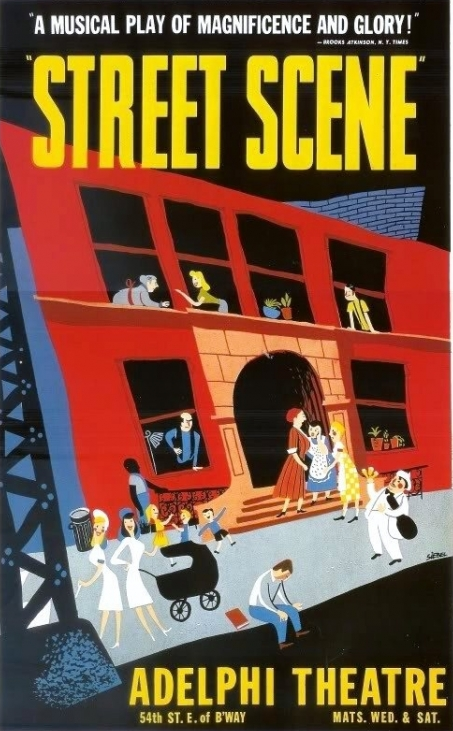
Version 1
Street Scene (1947-01-Adelphi Theatre-Broadway)
Type de série: OriginalThéâtre: George Abbott Theatre (Broadway - Etats-Unis) Durée : 4 mois 1 semaine Nombre : 148 représentationsPremière Preview : 09 January 1947
Première: 09 January 1947
Dernière: 17 August 1947Mise en scène : Charles Friedman • Chorégraphie : Anna Sokolow • Producteur : Star(s) : Avec: Greta Fiorentino ... Helen Arden / Emma Jones ... Hope Emerson / Olga Olsen ... Ellen Repp / Anna Maurrant ... Polyna Stoska / Sam Kaplan ... Brian Sullivan / Daniel Buchanan ... Remo Lota / Frank Maurrant ... Norman Cordon / Lippo Fiorentino ... Sydney Rayner / Rose Maurrant ... Anne Jeffreys / Mae Jones ... Sheila Bond
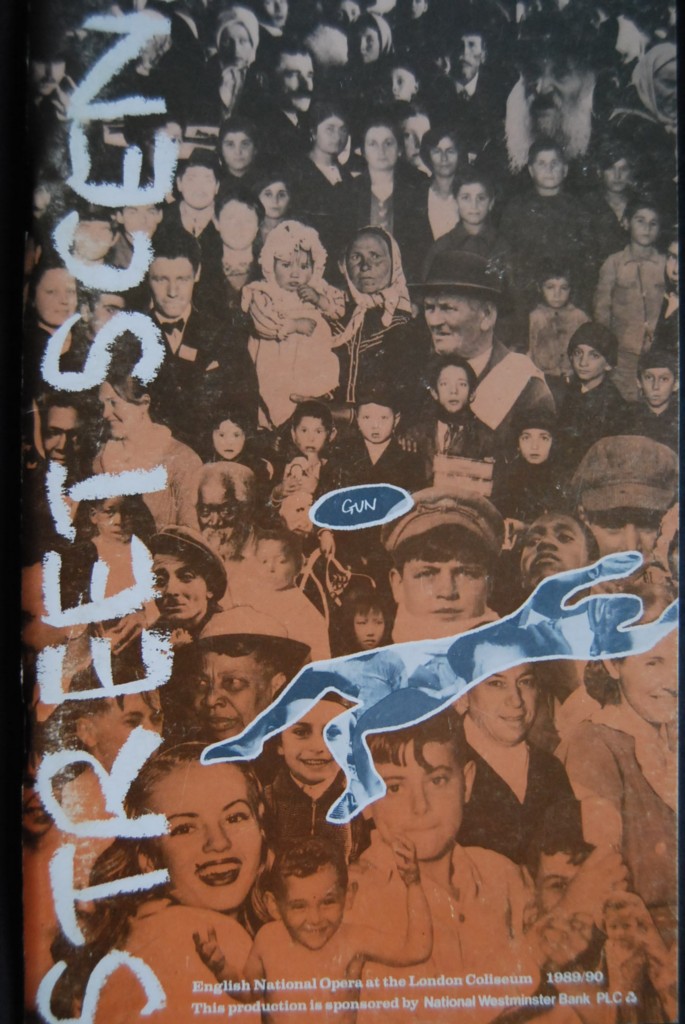
Version 2
Street Scene (1989-10-Coliseum Theatre-London)
Type de série: Original LondonThéâtre: Coliseum Theatre (Londres - Angleterre) Durée : Nombre : Première Preview : 12 October 1989
Première: 12 October 1989
Dernière: InconnuMise en scène : David Pountney • Chorégraphie : Producteur : Star(s) : Avec: Abraham Kaplan ... Terry Jenkins / Greta Fiorentino ... Susan Bullock / Salvation Army Girl ... Marian Martin / ... Melodie Waddingham / Carl Olsen ... Arwel Huw Morgan / Emma Jones ... Meriel Dickinson / Olga Olsen ... Angela Hickey / Shirley Kaplan ... Blythe Duff / Henry Davis ... Neil Patterson / Willie Maurrant ... Daniel Ison
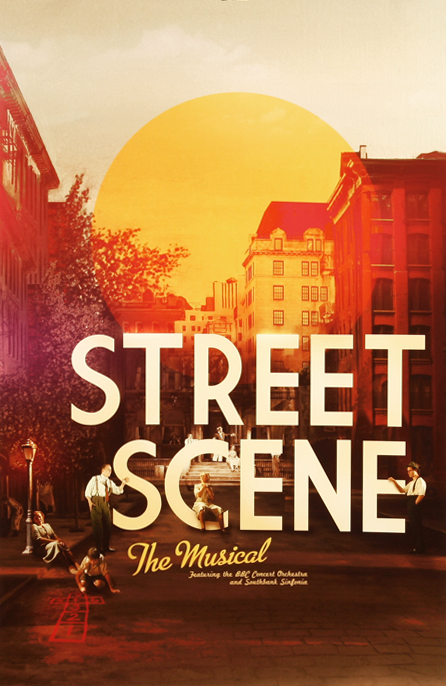
Version 3
Street Scene (2008-07-Young Vic-London)
Type de série: RevivalThéâtre: Young Vic Theatre (Londres - Angleterre) Salle : Main StageDurée : Nombre : Première Preview : 17 July 2008
Première: 17 July 2008
Dernière: 22 July 2008Mise en scène : Dave Fulljames • Chorégraphie : Arthur Pita • Producteur : Star(s) : Avec: Cast: Elena Ferrari (Anna), Andrew Slater (Frank), Ruby Hughes (Rose), Simon Lobelson (Harry Easter), Adrian Dwyer (Sam Kaplan),
Charlotte Page (Emma Jones), Harriet Williams (Mrs Olsen), Kate Nelson (Mae), John Moabi (Dick McGann). (The 16 strong cast did considerable doubling)Commentaires : This first revival was greeted more enthusiastically than the ENO production - possibly the passing of twenty years and the development of more serious and challenging musicals in the intervening period made it easier to accept that Kurt Weill was writing ahead of his time.
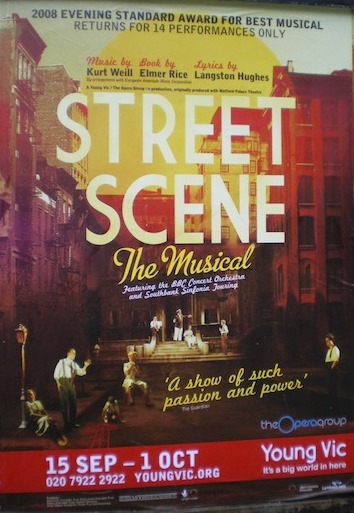
Version 4
Street Scene (2011-09-Young Vic-London)
Type de série: RevivalThéâtre: Young Vic Theatre (Londres - Angleterre) Salle : Main StageDurée : 1 semaine Nombre : Première Preview : 15 September 2011
Première: 20 September 2011
Dernière: 01 October 2011Mise en scène : Dave Fulljames • Chorégraphie : Arthur Pita • Producteur : Star(s) : Avec: Elena Ferrari (Anna), Geoffrey Dolton (Frank), Susanna Hurrell (Rose), James McOran-Campbell (Harry Easter), Paul Curievici (Sam Kaplan), Charlotte Page (Emma Jones), Harriet Williams (Mrs Olsen), Kate Nelson (Mae), John Moabi (Dick McGann). (The 20-strong cast did considerable doubling)Commentaires : This was a revival of th Young Vic’s 2008 production, enlarged as a community venture with a small army of child performers, a large amateur chorus and the BBC Concert Orchestra. Several of the original cast re-created their roles in
this revival. For the subsequent tour the orchestra was replaced with the Southbank Sinfonia Touring.Presse : ‘An extraordinary musical.'
Evening Standard
‘A show of such passion and power… a show that deserves to be seen.'
The Guardian
'If you want to see a theatre at maximum throttle, head to the Young Vic.'
The Daily Telegraph
Pas encore de video disponible pour ce spectacle